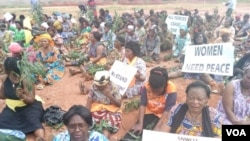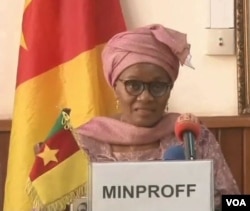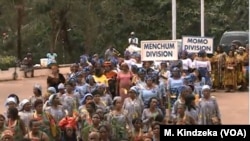Cameroon's women and children have suffered disproportionately in the country's five-year separatist conflict. But a report by the International Crisis Group says the role of women has expanded from just being victims to being rebels and peacemakers.
The anglophone separatist conflict in the country’s western regions has severely impacted women and put them at greater risk of violence.
Brussels-based think tank the International Crisis Group (ICG), in a report released Wednesday, says women have suffered more than the region’s men since armed conflict broke out in 2017.
"Some of the violence women have suffered include kidnaping, rape, torture and execution," said Arrey Elvis Ntui, the ICG’s senior consulting analyst for Cameroon. "The conflict has destroyed critical medical infrastructure thereby depriving women of access to health. It has further exposed them to other ills like trafficking and sexual exploitation. The authorities should persecute those who are responsible for crimes and include women in the peace process. Separatists must ensure an effective end to the school sabotage and stop the practice of requiring women to serve them in their camps."
Cameroon’s separatist groups deny abusing women — and say that some women have joined their forces freely.
Capo Daniel is deputy defense chief of the Ambazonia Defense Forces (ADF), one of the biggest rebel groups in Cameroon.
"It is unfortunate that the Crisis Group will target the Ambazonian forces for something that is not substantiated. There have been no circumstances where women have been seen in our camps against their will. There are members within our forces who are women, who are volunteers," he said.
Rights activists accuse government troops of abusing women too, though officials deny it.
Marie-Thérèse Abena Ondoa, Cameroon's minister of Women's Empowerment and the Family, says Cameroon is working with female peace campaigners in initiatives to end the conflict.
"The Ministry of Women's Empowerment and the Family along with women leaders stepped up to express their indignation on the murder of their sisters and children by secessionists in the North West and South West regions. The government has made the promotion of human rights of its citizens a major concern," she said.
More than a thousand Cameroonian women converged in Yaounde last August for a first-ever peace convention to try to end the conflict.
They asked rebels and government troops to lay down their guns so peace could return to the restive regions, but fighting has continued.
Violence erupted in Cameroon’s western regions in 2017 after English-speaking teachers and lawyers protested against discrimination by the country's French-speaking majority. The military responded with a crackdown and separatists took up arms.
The United Nations says about 3,500 people have been killed and at least 700,000 displaced, with women and children the most affected.






